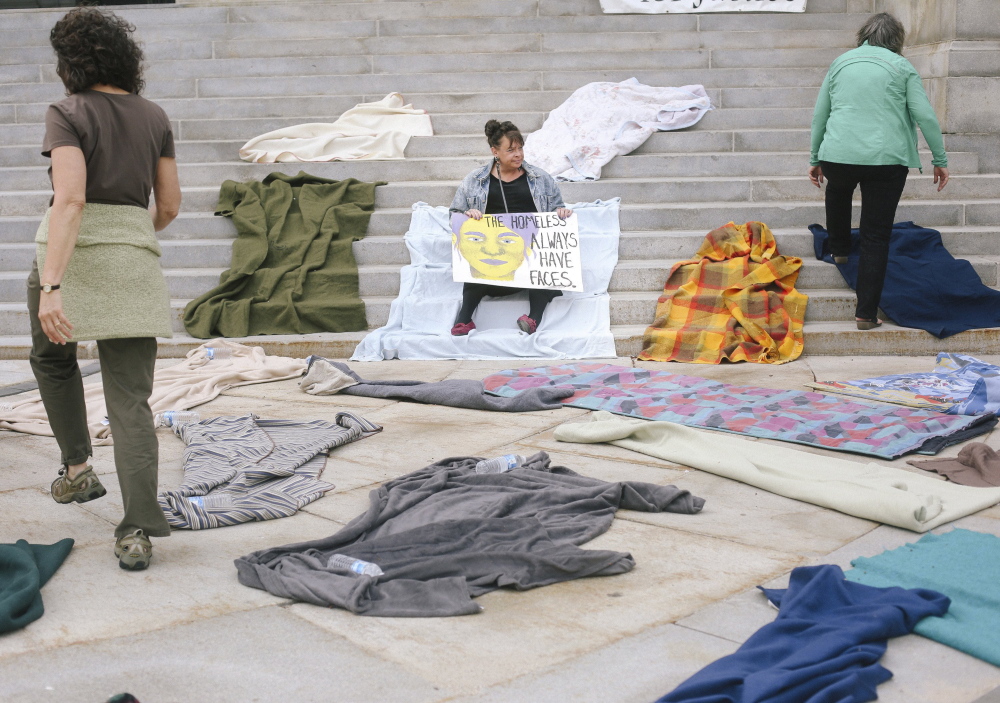The Portland City Council may vote Monday on a slate of budget items for the fiscal year starting July 1, including whether to close the city’s overflow emergency shelter and whether to stop providing General Assistance to certain types of immigrants, including asylum seekers.
Other items in the proposed $221.8 million budget include more than a dozen layoffs, a 35 percent increase in the price of city-issued blue trash bags, and a variety of fee increases, all of which are being proposed to fill a $10 million gap between projected revenues and expenses caused by a big drop in state aid and contractual salary and benefit increases for staff.
The City Council’s Finance Committee voted 2-2 to send the acting city manager’s proposed budget, which eliminated 24 positions, to the full council for a final decision. The committee was split over forming a new Housing Safety Office that would report to the city manager and using $500,000 in surplus funds to ease the impact on taxpayers, who could see a 2.9 percent increase in property taxes. The proposed increase would bring the city’s tax rate to $20.58 per $1,000 of assessed value, up from $20.
So far, the council has faced community pressure to restore cuts made to a school-based dental clinic, the homeless overflow shelter and welfare benefits for asylum seekers.
The Finance Committee restored roughly $130,000 in funding for the dental clinic, but the shelter and welfare issues are still being discussed.
At a public hearing on May 5, dozens of asylum seekers packed Council Chambers at City Hall. They begged the council to continue providing them with temporary assistance until the court resolves a dispute about whether the LePage administration followed the appropriate process last year in creating a rule change to bar asylum seekers from receiving General Assistance.
Asylum seekers often rely on GA to meet basic needs for food, shelter and clothing while awaiting authorization from the federal government to work – a process that can take months.
A judge in Cumberland County Superior Court heard oral arguments Friday from the state and attorneys representing the Maine Municipal Association and the cities of Westbrook and Portland. MMA and the cities argued that the state is trying to institute the new rule by decree, but the state argued that it is simply following federal law. No ruling was issued.
Meanwhile, Sen. Eric Brakey, R-Auburn, has submitted a bill, L.D. 369, to codify the administration’s position that asylum seekers are not eligible for GA. The bill was tabled April 29 by the Legislature’s Health and Human Services Committee.
If the city loses the court case, local taxpayers would have to make up $4.6 million in the current budget for the aid that has already been provided to asylum seekers but might not be reimbursed by the state. If the city continues providing GA to asylum seekers next year and does not receive state funds to help pay for that aid, it is expected to cost Portland taxpayers an additional $5.7 million, according to the city’s finance director.
Other proposals to close the overflow emergency shelter and to stop using hotels as temporary overflow emergency shelters for families have also drawn crowds to City Hall.
The city may institute the changes in response to a state audit, which declared that the state would no longer pay for the operating costs of city shelters. Instead, the state would pay a per night rate for only those people who are financially eligible to receive GA.
Homeless advocates held a demonstration Tuesday in City Hall Plaza protesting the proposed closure of the city’s overflow shelter at the Preble Street Resource Center. The city pays rent and for overnight staff at the 75-bed overflow shelter, which has been used every day since it opened in 2010.
Advocates argued that policy changes could result in 100 people being forced into the streets, unable to find shelter.
The acting manager’s budget proposal includes $350,000 to help people affected by the policy changes. It also increases the local share of the city’s GA program, which is partially funded by the state, by $1 million.
Send questions/comments to the editors.



